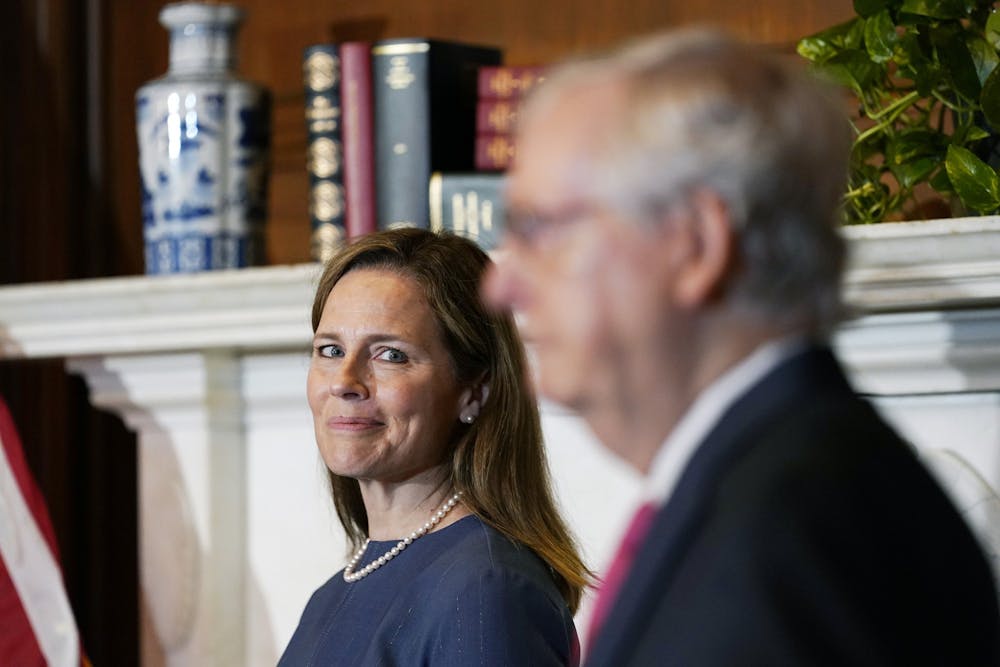President Donald Trump announced his intent to nominate Judge Amy Coney Barrett Saturday to fill the Supreme Court vacancy left by the death of Justice Ruth Bader Ginsberg.
Barrett has served as a circuit judge on the U.S. Court of Appeals for the Seventh Circuit since 2017. She has also been a professor of law at Notre Dame Law School.
Barrett has given controversial opinions and rulings across key issues debated in U.S. society, including Title IX, abortion rights, the Affordable Care Act and Second Amendment rights.
Kristen Jozkowski, a senior scientist at the Kinsey Institute and professor in sexual health in the IU School of Public Health-Bloomington, said the nomination is a step back from the slow cultural shift in the U.S. to hold sexual assaults accountable and protect victims.
Barrett suggested in writing the unanimous decision of the Seventh Circuit in Doe v. Purdue University that the university violated a male student’s Title IX rights by punishing him based on anti-male sex bias, resulting in his loss of his Navy ROTC scholarship. She also wrote the university denied him due process by not interviewing the assault victim and withholding evidence in alleging him of sexual assault.
Jozkowski said Barrett’s opinion doesn’t support the progress made in recent years on college campuses to decrease sexual assault. However, she said it has always been hard in the U.S. to address sexual violence.
“To say that we’re going full steam ahead, progressing toward addressing the sociocultural factors underlying sexual violence — not entirely true if we’re taking two steps forward and one step back,” she said.
Regarding abortion rights, Jozkowski said she anticipates Barrett to follow in the footsteps of Justice Brett Kavanaugh in her Senate confirmation hearing by avoiding explicitly commenting on Roe v. Wade.
She said, however, it’s possible Roe v. Wade will be overturned once Barrett is confirmed to the Supreme Court, and it’s plausible there will be another case in the future challenging the 1973 landmark case that protected a woman’s right to abortion without excessive government restriction.
When talking about the Supreme Court’s future shortly before the 2016 presidential election in a public lecture at Jacksonville University, Barrett said although she didn’t think Roe’s protection of women’s right to an abortion would change, some parts of it could change.
"The question of whether people can get very late-term abortions, how many restrictions can be put on clinics – I think that would change,” she said.
Barrett’s nomination can also challenge the Patient Protection and Affordable Care Act, also known as Obamacare, said Kosali Simon, a professor at the O’Neill School of Public and Environmental Affairs and associate vice provost for health sciences.
“Bottom line is that no longer having Justice Ginsburg and instead having an appointee from the current administration brings much uncertainty to this case,” she said.
One of the key platforms of Trump’s 2016 presidential campaign was to repeal the Affordable Care Act.
“If I win the presidency, my judicial appointments will do the right thing unlike Bush's appointee John Roberts on ObamaCare,” he said in a tweet in 2015.
Barrett’s nomination is also very concerning for gun control, said Paul Helmke, former mayor of Fort Wayne and current professor of practice at the O’Neill School. He was also former president of the nonprofit Brady: United Against Gun Violence.
In Barrett’s dissent in Kanter v. Barr, she wrote that the defendant, Rickey Kanter, shouldn’t have been disqualified from owning a gun despite being convicted of mail fraud — a felony. She argued in the 37-page dissent that a nonviolent felony conviction shouldn’t automatically disqualify a person from owning a gun.
Former Justice Antonin Scalia, referred to by Barrett as her mentor, wrote the majority opinion in the Supreme Court case District of Columbia v. Heller in which he upheld “longstanding prohibitions on the possession of firearms by felons and the mentally ill.”
Helmke said Barrett’s dissent in Kanter v. Barr showed a very narrow interpretation of the Second Amendment, ignoring 50 years of precedent which goes against her mentor Scalia’s opinion, who was already strongly legally conservative.
“A felon is someone who shows they don’t care about the law,” he said. “If they don’t care about serious laws, enough to become a felon, then we shouldn’t trust someone like that.”
Barrett’s dissent includes a substantial review of the history and tradition of the Second Amendment, arguing the writers of the Constitution could not have intended to prevent nonviolent felons from owning a gun.
Helmke said her reasoning was flawed because there were not as many criminals and felons in the 18th century and those felons were often executed.
He said he believes Barrett will be confirmed to the Supreme Court and gun control legislation will be strongly challenged. Background checks and bans on full-auto and assault weapons and high-capacity magazines could be in jeopardy under Barrett's narrow interpretation of the Second Amendment, he said.
Helmke said the Senate should not confirm Barrett to the Supreme Court because a justice has never been confirmed this close to the election in history before. He said it’s inexcusable that Republicans refused to hold a confirmation hearing in 2016 after President Barack Obama nominated Judge Merrick Garland to fill the vacancy left by the death of Justice Scalia.
“The President would have the right to nominate somebody on Jan. 19,” he said, “and if he had a friendly Senate, they could shove it through on the night of the 20th. That’s constitutional. Just because it’s constitutional doesn’t mean it’s advised or the right thing to do.”




